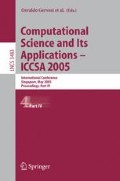Abstract
This paper introduces our approach to apply synthetic characters to behavior training in primary schools. Project groups include research centers from UK, Portugal, and China. Research members include artificial intelligent group, graphical group, educational group and psychological group. 24 months co-operation work and 4 meetings exchanging idea proof plentiful and substantial results. A closer link between China and EU countries in use of 3D interactive graphic environments in e-Learning has been established. Investigate results of synthetic characters in Potential Virtual Environments (PSE) is achieved from students’ bullying phenomena, empathy change theory, In addition, the open source movement of designing synthetic characters has been launched. Both Asia IT&C committee and project groups are looking forward to new results.
Access this chapter
Tax calculation will be finalised at checkout
Purchases are for personal use only
Preview
Unable to display preview. Download preview PDF.
References
John, F., Xiaoyuan, T., Demetri, T.: Cognitive Modeling: Knowledge, Reasoning and Planning for Intelligent Characters. In: The Proceedings of SIGGRAPH, pp. 29–38 (1999)
Martinho, A.P.: Pathematic Agents: Rapid development of Believable Emotional Agents in Intelligent Virtual Environments. In: The Proceedinsg of Autonomous Agents, pp. 1–8 (1999)
Paiva, A., Prada, R., Machado, I.: Heroes, villains, magicians: Dramatis Personae in a virtual story creation environment. In: The Proceedings of Intelligent User Interfaces (2001)
Bruce, B., Marc, D., Yuri, A.I., et al.: Integrated Learning for Interactive Synthetic Characters. In: The Proceedings of SIGGRAPH, pp. 417–426 (2002)
Magerko, B., Laird, J.E., Assanie, M., Kerfoot, A., Stokes, D.: AI Characters and Directors for Interactive Computer Games. In: The Proceedings of 16th Innovative Applications of Artificial Intelligence Conference, pp. 877–883 (2004)
Laird, J.E., Duchi, J.C.: Creating Human-like Synthetic Characters with Multiple Skill Levels:A Case Study using the Soar Quakebot. In: The Proceedings of the AAAI Fall Symposium (2000)
Song, Y.Y., Robert, C.B., Bruce, B., et al.: Interactive Training for Synthetic Characters Interactive training for synthetic characters. In: The Proceedings of AAAI, pp. 249–254 (2002)
Prada, R., Otero, N., Vala, A., Paiva, A.: BeLife: Teaching Greenhouse Management Using an Agent Based Simulator. In: The Proceedings of Agent Based Simulation Workshop (2004)
Burke, R., Isla, D., Downie, M., et al.: Creature smarts: The art and architecture of avirtual brain. In: The Proceedings of the Computer Game developers Conference (2001)
Pan, Z.G., Zhu, C.H., Rui, P., et al.: Emotion modeling and interaction in intelligent virtual environment. In: The Proceedings of 3IA, pp. 1–6 (2004)
Erich, G., Richard, H., Ralph, J., et al.: Design Patterns, Elements of Reusable Object-Oriented Software. Addison Wesley, Reading. ISBN:0-201-63361-2
Tracy, J.M., James, R.: The struture of emotion: A nonlinear dynamic systems approach. In: Mayne, T.J., Bonanno, G.A. (eds.) Emotions: Current Issues and Future Directions, pp. 1–36. The Guilford Press, New York (2001)
Pan, Z.G., Xu, W.W., Huang, J., Zhang, M.M., et al.: EasyBowling: A Virtual Bowling System based on Virtual Simulation. Computers & Graphics 27(2), 231–238 (2003)
Wu, J.H.: The research way to emotion. In: The Proceedings of ACII, pp. 6–12 (2003)
Roussos, M., Johnson, A., Leigh, J., et al.: Constructing Collaborative Stories Within Virtual Learning Landscapes. In: The Proceedings of AIED, pp. 129–135 (1996)
Pan, Z.G., Shi, J.Y.: Virtual Reality and Application. Computers & Graphics 27(2) (2003)
Downie, M.: Behavior, animation, music: the music and movement of synthetic characters. Master’s thesis, The Media Lab., MIT (2000)
Yoon, S., Blumburg, B., Schneider, G.: Motivation-driven learning for interactive synthetic characters. In: The Proceedings of the Fourth International Conference on Autonomous Agents (2000)
Pan, Z.G., Shi, J.Y.: Virtual Reality Technology Development in China: An Overview. The International Journal of Virtual Reality 4(3), 2–10 (2000)
Shi, J.Y., Pan, Z.G.: China: Computer Graphics Education Available at Universities, Institutes and Training Centers. Computer Graphics 31(3), 7–9 (1999)
Author information
Authors and Affiliations
Editor information
Editors and Affiliations
Rights and permissions
Copyright information
© 2005 Springer-Verlag Berlin Heidelberg
About this paper
Cite this paper
Ye, L., Zhu, J., Zhang, M., Aylett, R., Ren, L., Xu, G. (2005). E-Learning Environment Based on Intelligent Synthetic Characters. In: Gervasi, O., et al. Computational Science and Its Applications – ICCSA 2005. ICCSA 2005. Lecture Notes in Computer Science, vol 3483. Springer, Berlin, Heidelberg. https://doi.org/10.1007/11424925_4
Download citation
DOI: https://doi.org/10.1007/11424925_4
Publisher Name: Springer, Berlin, Heidelberg
Print ISBN: 978-3-540-25863-6
Online ISBN: 978-3-540-32309-9
eBook Packages: Computer ScienceComputer Science (R0)

